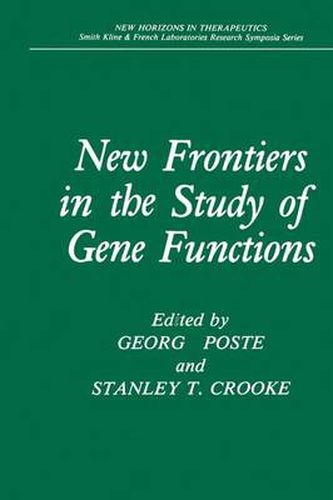Readings Newsletter
Become a Readings Member to make your shopping experience even easier.
Sign in or sign up for free!
You’re not far away from qualifying for FREE standard shipping within Australia
You’ve qualified for FREE standard shipping within Australia
The cart is loading…






The heat-shock proteins in E. coli are transiently overexpressed af- ter shift to a higher growth temperature. The genes that encode the HSPs are preceded by promoters transcribed in vitro by a form of RNA poly- 32 32 merase holoenzyme containing a 32-kd a subunit (Ea ). The a subunit is encoded by the rpoH (htpR) gene, previously identified as a positive 32 effector of the heat-shock response. Our evidence suggests that Ea is the enzyme that transcribes heat-shock genes at all temperatures. The level 32 of a may be regulated at several points: Accumulation of rpoH mRNA 32 is affected by temperature shift, a synthesis is regulated posttranscrip- 32 tionally, and a is an unstable molecule with a tl/2 of 5 min. Many mu- tations in the HSPs are shown to have defects in proteolysis. References Baker. T. A. , Grossman. A. D . . and Gross. C. A. , 1984, A gene regulating the heat shock response in Escherichia coli also affects proteolysis. Proc. Natl. A cad. Sci. US. A. 81:6779-6783. Bardwell, J. C. A . . and Craig, E. A . . 1984. Major heat shock gene of Drosophila and the Escherichia coli heat-inducible dnaK gene are homologous, Proc. Natl. Acad. Sci. US. A. 81:848-852. Bukhari. A. I. . and Zipser. D . . 1973, Mutants of Escherichia coli with a defect in the degradation of nonsense fragments, Nature New Bioi. 243:238-241. Charette. M. F. , Henderson, G. W. , and Markovitz, A.
$9.00 standard shipping within Australia
FREE standard shipping within Australia for orders over $100.00
Express & International shipping calculated at checkout
The heat-shock proteins in E. coli are transiently overexpressed af- ter shift to a higher growth temperature. The genes that encode the HSPs are preceded by promoters transcribed in vitro by a form of RNA poly- 32 32 merase holoenzyme containing a 32-kd a subunit (Ea ). The a subunit is encoded by the rpoH (htpR) gene, previously identified as a positive 32 effector of the heat-shock response. Our evidence suggests that Ea is the enzyme that transcribes heat-shock genes at all temperatures. The level 32 of a may be regulated at several points: Accumulation of rpoH mRNA 32 is affected by temperature shift, a synthesis is regulated posttranscrip- 32 tionally, and a is an unstable molecule with a tl/2 of 5 min. Many mu- tations in the HSPs are shown to have defects in proteolysis. References Baker. T. A. , Grossman. A. D . . and Gross. C. A. , 1984, A gene regulating the heat shock response in Escherichia coli also affects proteolysis. Proc. Natl. A cad. Sci. US. A. 81:6779-6783. Bardwell, J. C. A . . and Craig, E. A . . 1984. Major heat shock gene of Drosophila and the Escherichia coli heat-inducible dnaK gene are homologous, Proc. Natl. Acad. Sci. US. A. 81:848-852. Bukhari. A. I. . and Zipser. D . . 1973, Mutants of Escherichia coli with a defect in the degradation of nonsense fragments, Nature New Bioi. 243:238-241. Charette. M. F. , Henderson, G. W. , and Markovitz, A.